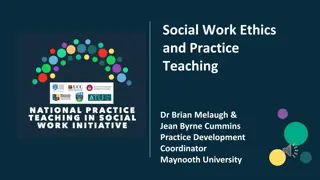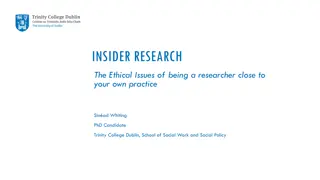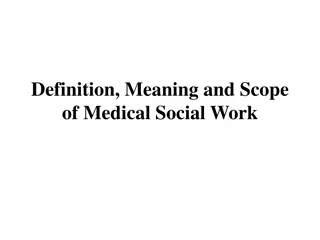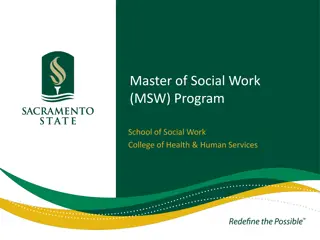Importance of Research in Social Work Practice
Understanding the significance of research in social work practice is essential for maintaining accountability and professionalism. Social workers are urged to engage in practice-informed research, evaluate interventions diligently, and promote responsible research practices. By utilizing the five ways of knowing and different approaches to the scientific method, social workers can enhance their practice and contribute to the development of knowledge in the field. Embracing research not only allows social workers to explore, describe, and explain social phenomena but also empowers them to make informed decisions for the betterment of individuals, families, groups, organizations, and communities.
Download Presentation

Please find below an Image/Link to download the presentation.
The content on the website is provided AS IS for your information and personal use only. It may not be sold, licensed, or shared on other websites without obtaining consent from the author.If you encounter any issues during the download, it is possible that the publisher has removed the file from their server.
You are allowed to download the files provided on this website for personal or commercial use, subject to the condition that they are used lawfully. All files are the property of their respective owners.
The content on the website is provided AS IS for your information and personal use only. It may not be sold, licensed, or shared on other websites without obtaining consent from the author.
E N D
Presentation Transcript
Chapter 1 Why Study Research?
Toward Accountability Council on Social Work Education Competency 4: Engage in Practice-informed Research and Research-informed Practice Competency 9: Evaluate Practice with Individuals, Families, Groups, Organizations, and Communities National Association of Social Workers Social workers should monitor and evaluate policies, the implementation of programs, and practice interventions.
Toward Accountability Social workers should promote and facilitate evaluation and research to contribute to the development of knowledge. Social workers should critically examine and keep current with emerging knowledge relevant to social work and fully use evaluation and research evidence in their professional practice. Social workers should report evaluation and research findings accurately. They should not fabricate or falsify results and should take steps to correct any errors later found in published data using standard publication methods.
Toward Accountability Social workers engaged in evaluation or research should be alert to and avoid conflicts of interest and dual relationships with participants, should inform participants when a real or potential conflict of interest arises, and should take steps to resolve the issue in a manner that makes participants interests primary. Social workers should educate themselves, their students, and their colleagues about responsible research practices.
The Five Ways of Knowing 1. Authority Questioning the Accuracy of Authority Figures 2. Tradition Sorry, That s the Way It s Done Around Here The Need to Fit In 3. Experience 4. Beliefs and Intuition Professional Ethical Concerns
The Five Ways of knowing 5. The Scientific Method Phases of the Scientific Method It Doesn t Exist If It Can t Be Observed and Measured Nothing Is Absolutely Certain Forever Three Purposes of Social Work Research 1. To explore 2. To describe 3. To explain
Three Approaches to the Scientific Method 1. The Quantitative Approach 2. The Qualitative Approach 3. The Mixed-Methods Approach
Six Questions to Ask When Selecting a Research Approach (Questions 1 & 2) 1. What exactly am I trying to find out? Different questions require different methods to answer them. 2. What kind of focus on my topic do I want to achieve? Do I want to study this phenomenon or situation in detail? Or am I mainly interested in making standardized and systematic comparisons and in accounting for variance?
Six Questions to Ask When Selecting a Research Approach (Questions 3 & 4) 3. How have other researchers dealt with this topic? To what extent do I wish to align my project with this literature? What practical considerations should sway my choice? For instance, how long might my study take, and do I have the resources to study it this way? Can I get access to the single case I want to study in depth? Are samples and data readily available? 4.
Six Questions to Ask When Selecting a Research Approach (Questions 5 & 6) 5. Will I learn more about this topic using a quantitative, a qualitative, or a mixed-methods research approach? What will be the knowledge payoff of each research approach? What seems to work best for me? Am I committed to a particular research approach, which implies a particular methodology? Do I know what good quantitative, qualitative and mixed-methods research studies look like? 6.
Pure and Applied Research Studies 1. Pure Research Studies 2. Applied Research Studies The goal of pure research studies is to develop theory and expand our profession s knowledge base, and the goal of applied research studies is to develop solutions for problems and applications in practice.
Three Research Roles 1. The Research Consumer 2. The Creator and Disseminator of Knowledge 3. The Contributing Partner Integrating the Three Research Roles
Four Characteristics of Researchers 1. Value Awareness 2. Skeptical Curiosity 3. Sharing 4. Honesty
Got Attitude? Most people learn about the scientific method rather than about the scientific attitude. While the scientific method is an ideal construct, the scientific attitude is the way people have of looking at the world. Doing science includes many methods: what makes them scientific is their acceptance by the scientific collective.
Five Steps of Evidence-Based Practice 1. Convert your need for information about the causes of the problem, and for possible interventions, into an answerable question; 2. Track down the best evidence with which to answer that question; 3. Critically appraise that evidence for its validity, impact, and applicability; 4. Integrate the critical appraisal with your clinical expertise and the client s unique values and circumstances; and 5. Evaluate your effectiveness and efficiency in carrying out Steps 1 to 4 and seek ways to improve your practice.
12 Steps to Lifelong Learning (Steps 1 5) 1. Join the National Association of Social Workers. 2. Choose a professional social work conference that is relevant to your practice area, and make a commitment to attend every year. 3. Ask your manager or supervisor to subscribe to a professional journal(s). 4. Join a Listserv dedicated to critiquing knowledge in your area of practice. 5. Join your local library, and spend at least one day a month in professional development reading about the latest research in your area.
12 Steps to Lifelong Learning (Steps 6 10) 6. Initiate a brown-bag lunch session at your workplace at which you and your colleagues discuss research. 7. Attend research-based training and workshops whenever possible. 8. Continue your formal education by taking courses online or at a university or college. 9. Make a presentation to share your research findings at a conference. 10. Evaluate your day-to-day practices; that is, evaluate if you are effective with your clients.
12 Steps to Lifelong Learning (Steps 11 12) 11. Collaborate with others to evaluate the services provided by your agency or organization. 12. Seek employment in agencies and organizations whose culture supports using research and evaluating practice.
Definition of Social Work Research Social work research is a systematic and objective inquiry that utilizes the scientific method to solve human problems and creates new knowledge that is generally applicable to the social work profession.























